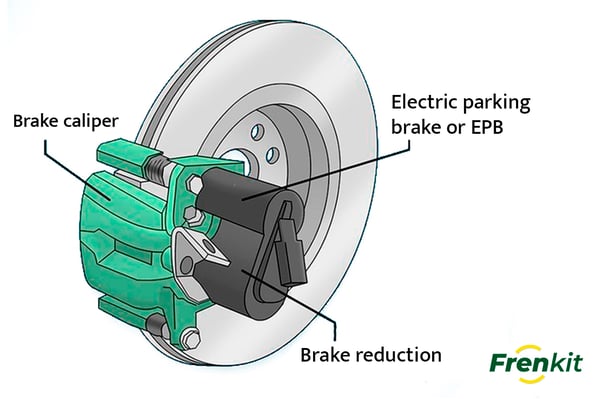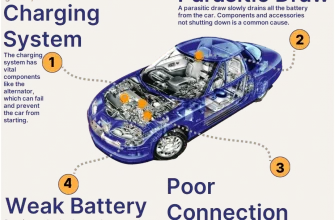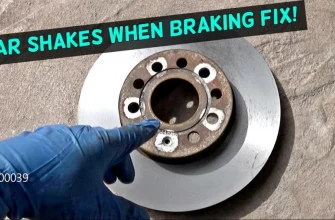When it comes to vehicle safety‚ the parking brake is an unsung hero․ Often overshadowed by the more prominent features of a vehicle‚ such as the accelerator and brake pedals‚ the parking brake plays a crucial role in ensuring both safety and stability․ In this article‚ we will delve into the function and importance of a parking brake‚ highlighting its necessity in everyday driving and its significance in emergency situations․
- What is a Parking Brake?
- How Does a Parking Brake Work?
- Why is a Parking Brake Important?
- 1․ Prevents Accidental Rolling
- 2․ Aids in Hill Starts
- 3․ Emergency Situations
- 4․ Legal and Insurance Implications
- Common Misconceptions About Parking Brakes
- Maintaining Your Parking Brake: Best Practices
- 1․ Regular Inspections
- 2․ Avoid Overusing the Parking Brake
- 3․ Keep It Clean
- 4․ Use It Correctly
- Common Issues and Troubleshooting
- 1․ The Parking Brake Doesn’t Engage
- 2․ The Parking Brake Is Stuck
- 3․ Warning Light on the Dashboard
What is a Parking Brake?
The parking brake‚ also known as the handbrake or emergency brake‚ is a secondary braking system in vehicles designed to keep the vehicle stationary when parked․ Unlike the primary braking system‚ which is used while driving to slow down or stop the vehicle‚ the parking brake is specifically intended to prevent the vehicle from rolling away when it is not in motion․
How Does a Parking Brake Work?
The mechanism of a parking brake can vary depending on the vehicle’s design․ There are two primary types of parking brakes:
- Mechanical Parking Brake: This is the traditional type‚ which operates using a cable connected to the rear brakes․ When the driver pulls the handbrake lever‚ the cable tightens and engages the brakes‚ preventing the wheels from turning․
- Electronic Parking Brake: This modern variation uses electronic controls to engage the brake․ When activated‚ a small motor clamps the brake pads onto the discs or drums‚ securing the vehicle in place․
Regardless of the type‚ both systems are designed to engage the rear brakes‚ which is critical for holding the vehicle stationary on an incline or flat surface․
Why is a Parking Brake Important?
The importance of a parking brake cannot be overstated․ Here are several reasons why it is essential for vehicle safety:
1․ Prevents Accidental Rolling
Without a functioning parking brake‚ a vehicle parked on an incline can easily roll away‚ leading to potential accidents․ Engaging the parking brake significantly reduces this risk‚ providing an essential safety net․
2․ Aids in Hill Starts
For drivers who need to start on a hill‚ the parking brake serves as a helpful tool․ By engaging the parking brake while transitioning from the brake to the accelerator‚ drivers can prevent the vehicle from rolling backward․
3․ Emergency Situations
In the event of a failure in the primary braking system‚ the parking brake can act as a backup․ While it is not intended for regular stopping‚ it can help slow down the vehicle in emergencies‚ giving drivers a chance to regain control․
4․ Legal and Insurance Implications
Many jurisdictions require the use of a parking brake when parking a vehicle․ Failing to engage the parking brake could lead to fines or insurance complications if an accident occurs as a result of negligence․
Common Misconceptions About Parking Brakes
Despite its importance‚ several misconceptions about the parking brake persist:
- “It’s only for parking․” While its primary function is to secure the vehicle when parked‚ it also plays a role in emergency braking situations․
- “I don’t need to use it if I’m on flat ground․” Regardless of the terrain‚ the parking brake should always be engaged to ensure maximum safety․
- “It’s only necessary in older vehicles․” All vehicles‚ whether new or old‚ benefit from the use of a parking brake․
The parking brake is more than just an accessory; it is a vital component of vehicle safety that every driver should understand and utilize․ By preventing vehicle roll-away incidents and providing an emergency braking option‚ the parking brake ensures that drivers can park safely and securely․ So‚ the next time you step out of your vehicle‚ remember to engage the parking brake, it’s a small action that can have a significant impact on safety․
Always prioritize vehicle safety by ensuring that your parking brake is functioning correctly and is used responsibly․ By doing so‚ you contribute to a safer driving environment for yourself and others on the road․
Maintaining Your Parking Brake: Best Practices
Understanding the function and importance of a parking brake is only part of the equation․ Just as vital is knowing how to maintain it effectively․ A parking brake that is not properly maintained can fail when you need it most․ Here are some best practices to ensure your parking brake remains in optimal condition:
1․ Regular Inspections
Just like the tires and engine‚ your parking brake should be part of your regular vehicle inspections․ Check the functionality by engaging and disengaging the brake while parked on a slight incline․ If the vehicle rolls‚ it’s time to have it serviced․
2․ Avoid Overusing the Parking Brake
While it’s essential to use the parking brake every time you park‚ refrain from using it excessively while driving․ Engaging the parking brake while the vehicle is in motion can cause wear and tear to the brake system‚ reducing its effectiveness over time․
3․ Keep It Clean
Debris‚ dirt‚ and moisture can accumulate around the parking brake mechanism‚ potentially leading to rust or malfunction․ Make it a habit to keep the area around the parking brake clean and free from obstructions․
4․ Use It Correctly
Familiarize yourself with the proper way to engage and disengage your parking brake․ Whether it’s a lever‚ a pedal‚ or an electronic button‚ understanding how your specific system works will help prevent unnecessary strain on the mechanism․
Common Issues and Troubleshooting
Despite regular maintenance‚ issues can still arise with the parking brake․ Here are some common problems and their potential solutions:
1․ The Parking Brake Doesn’t Engage
If you pull the lever or press the button and nothing happens‚ check for a broken cable or a malfunctioning electronic component․ Consulting a professional mechanic is usually the best course of action․
2․ The Parking Brake Is Stuck
This can happen due to rust or corrosion‚ especially in older vehicles․ Gently rocking the vehicle back and forth can sometimes free the brake․ If that doesn’t work‚ it’s time to seek professional help․
3․ Warning Light on the Dashboard
If the parking brake warning light remains illuminated‚ it may indicate that the brake is not fully released or that there’s a deeper issue at play․ Address this warning promptly to avoid further complications․
The parking brake may be a small lever or pedal in your vehicle‚ but its impact on safety cannot be underestimated․ By understanding its function‚ maintaining it properly‚ and being aware of common issues‚ drivers can ensure that this crucial component performs reliably when needed․ In the realm of vehicle safety‚ the parking brake is a steadfast ally—one that deserves your attention and care․
So‚ the next time you park your vehicle‚ take a moment to appreciate the role your parking brake plays․ It’s not just a feature; it’s a safeguard against the unpredictable․ Making a habit of using your parking brake diligently is a simple yet effective way to enhance your driving safety and prolong the life of your vehicle․









